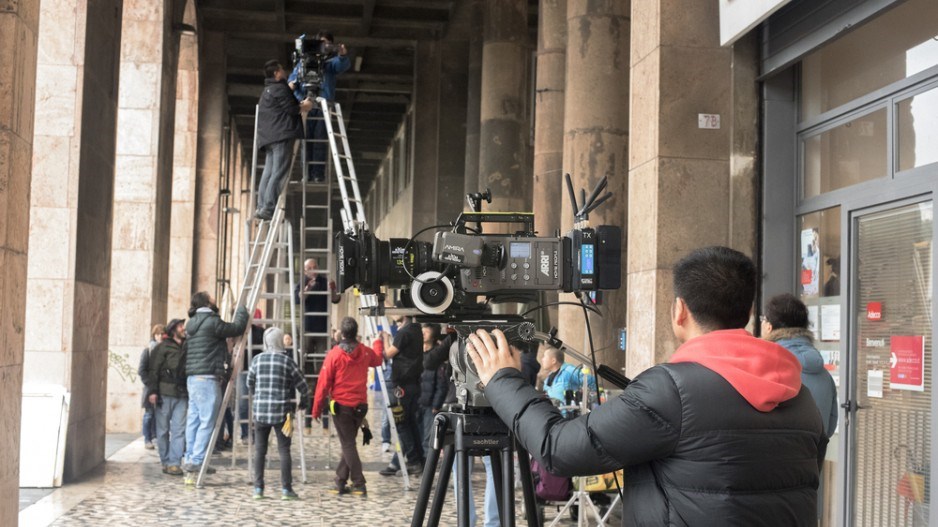New girl in town meets local boy. They fall in love. Her parents don’t approve.
It’s one of those universal stories told in cinemas across the globe, says Shel Piercy, president of Infinity Films Entertainment Group Ltd.
So after his company facilitated the filming of Chinese-financed Bayue and Weiyang in Vancouver last fall, Piercy recalls, he told director Wang Xiaofang he should shoot an English-language version of the Mandarin romantic comedy.
“They’re exactly like romantic comedies that exist in North America except they have a Chinese theme,” Piercy told Business in Vancouver. “And they’re hoping to bring in more productions.”
Infinity Films’ partnership with Chinese producers began last year following a trade mission to the Hong Kong International Film & TV Market (FILMART).
Piercy is returning to FILMART in March to secure more partnerships and perhaps even look at importing “unusual” TV formats from China into the North American market.
“The future looks promising,” said Piercy. “It’s probably going to take a couple years to develop fully but I believe we can do it really well.”
Creative BC is leading the delegation of this year’s trade mission to FILMART, flanked by local companies Arcana Studios, Brightlight Pictures Inc., Reunion Pictures Inc., PoPing Casting, APL Films and Pink Buffalo Films.
“We see a lot of investors that are looking to come into British Columbia,” said Robert Wong, Creative BC vice-president and acting B.C. film commissioner.
“But they’re also looking to partner up with existing companies that can help produce product that has that North American feel but mainly for an Asian market.”
In mid-January Paramount Pictures inked a US$1 billion deal with Shanghai Film Group Corp. and Beijing-based Huahua Media to co-produce and distribute films, according to Deadline.
While a Vancouver production house isn’t likely to land such a colossal deal, Piercy said Chinese money could still have a big impact on the local industry.
Facilitating the service production for Bayue and Weiyang required Infinity Films to smooth over cultural barriers as the Chinese crew shot the Vancouver-set film.
“They have a very efficient way of doing things, but they’re not used to the requirements. We have a very sophisticated industry in Vancouver. … We have approved ways of doing things in terms of safety and a manner of other things. And I think it was hard for them to get used to working that way.”
Wong added that working with the crew was a terrific experience nonetheless.
“We need to identify more Mandarin-speaking crews in town. I think we need to improve our documentation so more of it has been properly translated into Mandarin.”
And on the Cantonese side of the business, Infinity Films is gearing up for a co-production with Salon Films (HK) Ltd. that will go before cameras this November.
The Canadian-penned Second World War drama Brick Hill follows Hong Kong, British and Canadian characters during Japan’s invasion of the former British colony.
Meanwhile, Vancouver-based Darkhorse10 Pictures Inc. is also benefiting from Chinese capital.
The production house launched in December with backing from China’s Plusmos Film Technology.
CEO Jason Dowdeswell told BIV last month the company will spend the next three years developing original content for audiences on both continents.
“As a partnership, it means that the development we make over here has better means and grounds to be shown to the Chinese population,” said Dowdeswell, a former executive at Vancouver-based Sony Pictures Imageworks.
In the meantime, Darkhorse10 plans to generate revenue by building a 50-person team to do visual effects work for North American films as well as Plusmos’ own Chinese productions.
Wong said more partnerships like the one between Darkhorse10 and Plusmos will be needed to advance Chinese investment in Vancouver’s film industry.
“We get lots and lots of inquiries, but the hit rate is relatively low in the sense of projects landing here. It’s just going to take some time before there’s a true understanding of the business culture and how things are done here before we start seeing a wave of projects coming over from Asia.”
@reporton



